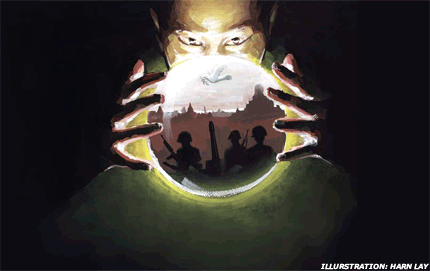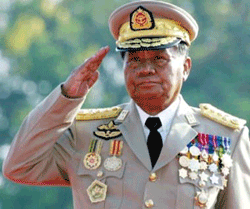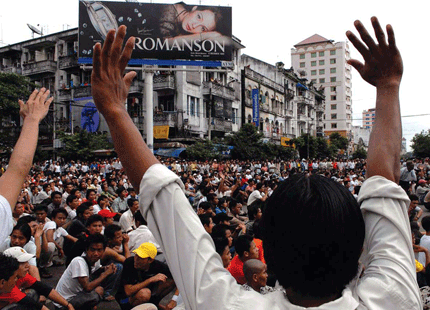Into the Unknown
Burma has a road map, but where will it lead?

Than Shwe’s legacy
If Burma’s ailing junta leader Snr-Gen Than Shwe were to die suddenly, his passing could trigger a coup and a fierce power struggle among the top generals and regional commanders. The dictator’s death could also open a window of opportunity for reform-minded military officers to adopt genuine political reform and to enter into political dialogue with the opposition.
 |
| Snr-Gen Than Shwe [Photo: Reuters] |
Than Shwe is also commander in chief of the armed forces, and his death could usher in a more pragmatic leadership possibly led by Gen Thura Shwe Mann or Gen Thein Sein, who may initiate economic reforms. However, hard-liners and Than Shwe loyalists might resist moderate changes, possibly triggering a purge and a coup within the military regime.
It’s believed that reform-minded and moderate officers are to be found within the armed forces. Since the bloody crackdown on demonstrating monks and other protesters in September, an increasing number of these officers, unhappy with the current military leadership, are reported to be in favor of change and international intervention.
They also expect the UN and powerful neighbors to employ positive and aggressive diplomacy to bring about change in Burma. It’s believed that they want to see a meaningful compromise with the opposition and Aung San Suu Kyi’s National League for Democracy, the landslide winner of the 1990 election.
These moderate forces may believe that reconciliation with Suu Kyi can bring a lasting political settlement as well as economic prosperity, foreign investment and development aid from the international community. If they receive encouragement and support from within and outside the armed forces, they may remove Than Shwe and his regime.
Another uprising?
Many observers are predicting another uprising in 2008, again led by monks and with the participation of students.
Members of Burma’s apolitical younger generation, who had no experience of the 1988 student-led uprising, were hugely inspired by the September demonstrations. Throughout the country, they formed cells and underground groups networking each other and keeping contact with the outside world and exile groups through the use of cell phones, digital cameras, e-mail and Internet blog sites. They were far better equipped than the activists and students of 1988.
 |
| Many observers predict more domonstrations in 2008 [Photo: Thierry Falise] |
This new generation could be a political opposition to be reckoned with, but unfortunately they are likely to remain an immature and decentralized force in dealing with the regime.
The country’s dire economic condition, the political stalemate, growing dissent and the regime’s intransigence fill the powder barrel for a major uprising in the near future. Influential abbots and religious and social leaders will be aggressively involved in any uprising and in shaping the future of Burma.
The worst-case scenario would be the death of Aung San Suu Kyi, who is now 62. Junta leaders may be waiting for her to pass away, leaving the National League for Democracy party without her leadership. Her death, however, could trigger a new uprising, resulting in another bloody crackdown and political turmoil in the country.
The ‘road map’
If the UN, Asean, China and the international community cannot influence positive change and a reconciliation process in Burma, the country’s military leaders will continue to implement their seven-point “road map.”
The completion of the “road map” will guarantee that the regime holds power indefinitely and will legitimize the role of the military dynasty in Burma.
1 | 2 | 3 next page »
